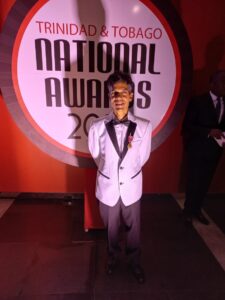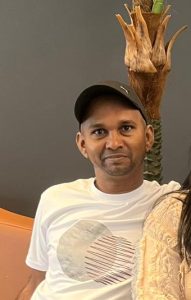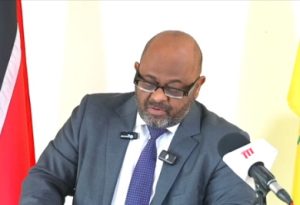‘I wanted to preserve that moment in 1989 when a country was united and use it as an illustration for men across the globe to see the potential of unity’

AS a teenager and young adult, during the 1980s and 1990s, I was bombarded by the negative images of men.
Men were stereotyped as sexual predators, corrupt, rapists, perpetrators of domestic violence, gamblers, alcoholics and drug addicts.
I decided to get involved in the men’s movement to highlight upright, good men who were ‘invisible’ and to also help or advise those men who were stereotyped, neglected, rejected and wrongly accused.
It was a time of uncertainty to rewrite the biased masculinity narrative. I chose November 19 for two reasons- it’s the birthday of my dad who I view as a role model, and I hoped that others would see their fathers and other father figures (uncles, grandfathers, male teachers, nephews etc) as role models. Secondly, on November 19, 1989, my country’s football (soccer) team, dubbed the Strike Squad, were defeated by the USA in a World Cup qualifying match. We didn’t make it to the finals in Italy in 1990.
Even though Trinidad and Tobago lost and were excluded from the World Cup, the emotions and feelings surrounding the sport generated a sense of unity and nationalism and more importantly, it transcended barriers of class, gender, ethnicity, religion, sexuality and geographical location.
‘Unfortunately, IMD is not recognised by the United Nations (UN) because many believe the focus of the UN should be on women and children’
I wanted to preserve that moment in 1989 when a country was united and use it as an illustration for men across the globe to see the potential of unity. It was this that prompted me to have the first observance of International Men’s Day (IMD) in 1999. The venue was Families in Action in Port of Spain and over the years other non-governmental organisations and government agencies have observed IMD.
IMD has six objectives that include the promotion of positive role models, improving gender relations, celebrating men’s positive contributions and creating a safer, peaceful world.
IMD’s main strength is its all-inclusiveness. All men are embraced as equals. An illustration of this is the supporters who are conservative, moderate and extreme. IMD is focused on repairing masculinity and reshaping minds to ensure a peaceful and progressive world. It is an ongoing movement (with men and women) to deconstruct stereotypes, remove barriers and cross boundaries that create hate, mistrust and death.
IMD is not celebrated globally.
This year, 93 countries will be observing it. Some of us will see this as a success but there is still more work to be done. Unfortunately, IMD is not recognised by the United Nations (UN) because many believe the focus of the UN should be on women and children.
More than a decade ago, I contacted the UN headquarters in New York and explained the significance of having IMD be deemed an official day. The UN responded that a member state of the UN needs to pass a resolution for other member states to vote for IMD to be on the UN calendar of events.
During the past 24 years, there have been many, many promises from governments, persons and groups that they will get the UN to officially declare IMD as an international day. My view is that even without the support or acknowledgement of the UN, International Men’s Day has become a powerful movement and ideology that saved and positively transformed millions of lives and families.
Unfortunately, IMD has very little impact on T&T. There are serious social problems involving males. For instance, the murder toll this year will cross 550. Furthermore, the issues of mental health is not a priority, the relatively high statistics of diabetes and heart ailments among men are troubling.
Some criticise men for not caring for their physical health but often the deterrent is a lack of money to afford private hospitals. The deplorable public health system has created fear among men. Many men often cannot afford the fees for medication or to visit a psychologist. Psychiatrists cannot simply use textbook therapies to help our males. Men are improperly diagnosed when there is the usage of foreign theories to analyse and assess the health strategies of Caribbean and Latin American men.
In the future, IMD must become a way of life to continue its meaningful and powerful messages which have positively impacted the lives of millions of boys and men. I hope IMD will be serious and uncompromising but this movement must also be seen as exciting and interesting to reach the younger generation and those young at heart. I would like to see IMD have a more meaningful role among developing countries in the Global South.
Dr Jereome Teelucksingh is a recipient of the Humming Bird (Gold) Medal for Education and Volunteerism. He is attached to the Department of History at the University of the West Indies at St Augustine. He has published books, chapters and journal articles on the Caribbean diaspora, masculinity, culture, politics, ethnicity and religion. Also, he has produced a documentary – Brown Lives Matter and presented papers at academic conferences. And, of course, he is the founder of IMD.
Click below to read other articles by Dr Jerome Teelucksingh:
Should International Agencies be Blamed for Unemployment
A Need to Observe Word Unemployment Day
An Ideology for the Trade Union Movement
The Man who Couldn’t be Prime Minister
Social Outburst vs Social Revolution
Challenges of the Men’s Movement
If George Floyd was Denied Parole
The Meaning of Indian Arrival Day in T&T
International Men’s Day – A Way of Life
Wounds that cause school violence
May Day: A Time for Solidarity, Strength
Who Coined the Term ‘Black Power’
![]()













